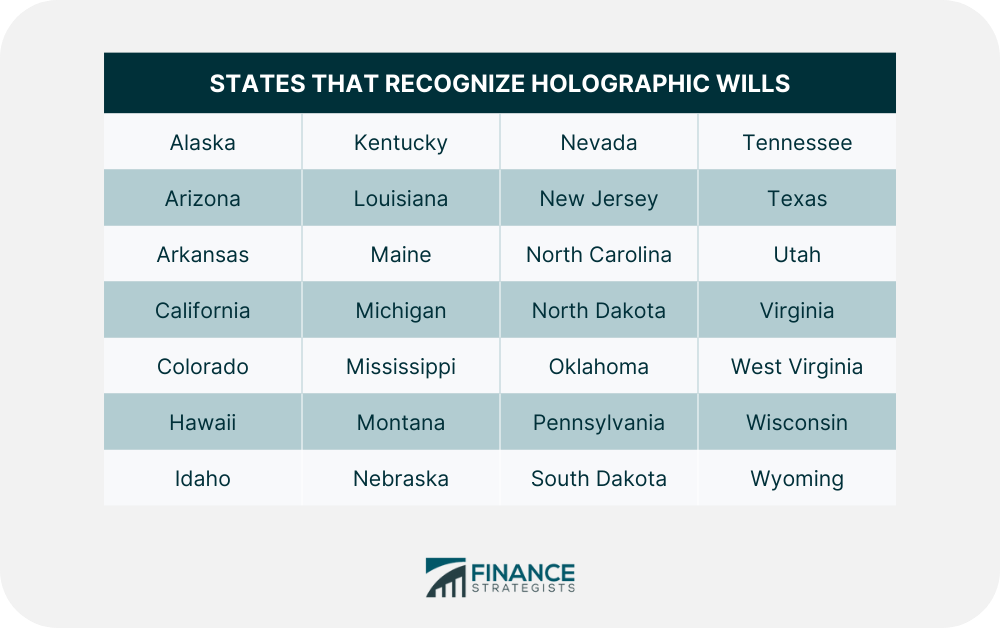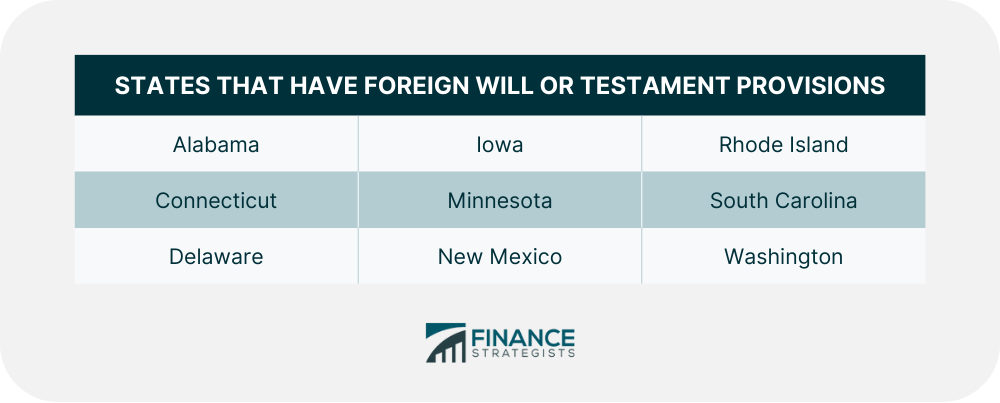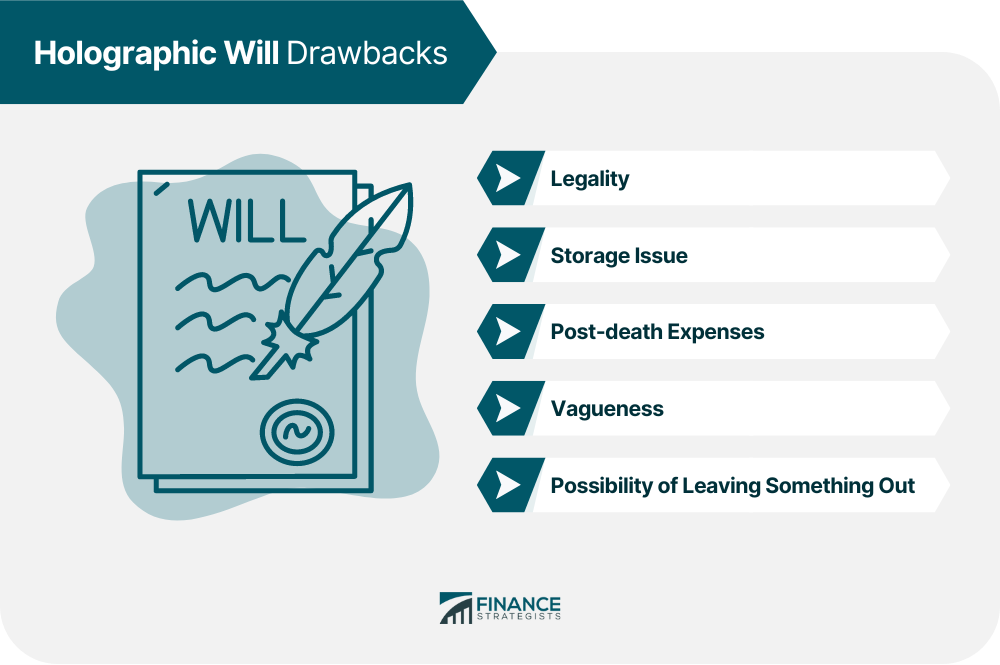A holographic will is written, dated, and signed entirely in the handwriting of the person creating the will or the testator, without the involvement of witnesses or a notary public. It is typically used by individuals who want a simple way to make their wishes known after they die. On the contrary, a typical will is usually prepared by a legal expert, such as a lawyer or a notary, and requires witnesses' signatures to confirm the will's authenticity. The process of creating a holographic will begins with the testator writing out their wishes for the disposition of their assets and property after their death. The testator must ensure that the will is legible, dated, and signed, as these elements are crucial to the will's validity. The will should also include a clear expression of the testator's intention to create a will and their desire to have it recognized as such after their death. Like any other type of will, it is important to specify the beneficiaries and the distribution of their assets. The testator can also provide specific conditions the beneficiaries must fulfill to receive the designated assets. Explaining why particular assets are being bequeathed to specific beneficiaries demonstrates the validity of a holographic will. For a court to accept handwriting as the deceased's, a handwriting expert or someone familiar with their writing must attest to its authenticity. It must be kept in a safe place and made accessible to the testator's chosen executor or family members upon their death. In some jurisdictions, a holographic will may only be considered valid if it meets specific criteria, such as being written entirely in the testator's handwriting or dated and signed. In other jurisdictions, holographic wills may not be recognized at all. It is essential to be familiar with the laws of the relevant authority to determine the validity of a holographic will. Holographic wills are often less formal, making it easier to be challenged in court. Various resources are available that provide instructions on creating a valid will. A printed will requires witnesses, while a holographic will does not. Seek the advice of an estate planning lawyer if there are concerns about the validity or enforceability of the will. A holographic will's validity depends on several key factors that must be considered and fulfilled for the will to be legally binding. A holographic will must be fully handwritten by the testator. The entire document must be written in the testator's handwriting, including the text and signature, to demonstrate the authenticity and personal nature of the will. The holographic will must bear the signature of the testator. The signature is evidence that the testator created and signed the will and is a crucial aspect of the will's validity. This will be verified by an expert or someone familiar with the testator's handwriting. The essential elements of a will must be included, such as a clear expression of the testator's intention to create a will and the disposition of their specific assets and property. It may consist of the particular conditions the beneficiaries must fulfill to receive the assets. Similarly, it must explain why certain assets, like property or securities, are being bestowed upon specific beneficiaries. This indicates that the testator was in their proper mental state when they composed the document. It also requires you to appoint guardians for your minor children and someone to carry out your wishes in your will. Typically, most states require that the will be signed by two witnesses, who serve to affirm that the testator wrote the will. While some courts may still recognize a holographic will without witnesses, it may be challenging to establish the will's validity without their testimony. The will must comply with any local requirements for witnessing or signing. The requirements will vary depending on the jurisdiction in which the holographic will is created. In the United States, several states recognize holographic wills as legally valid, but their conditions of acceptance still vary from state to state. In general, holographic wills are accepted in: Holographic wills created in some states may not be considered legally valid. However, these types of wills may still be accepted under the provisions for foreign wills if they were created in jurisdictions where holographic wills are recognized and enforceable. On the other hand, in New York and Maryland, holographic wills are only considered legally valid if an Armed Forces member creates them. The validity of such a will is limited to one year after the testator leaves the military unless they are deemed not of sound mind. Holographic wills can present some drawbacks that are worth considering before choosing it as the primary method of documenting one's last will and testament: Depending on the jurisdiction, holographic wills may not be legally recognized and enforceable. This means that there is a risk that the will may not be honored in probate court, leaving the distribution of assets in question. A holographic will is often handwritten and may not be stored securely, making it vulnerable to damage or loss. This can result in difficulty in proving its authenticity. Also, if a holographic will is stored in a location that is not easily accessible. Then, locating such document after the testator's death can be challenging. Suppose a holographic will is challenged in court. In that case, the cost of defending it can be high, increasing the expenses incurred after the testator's death. This can be especially problematic if the estate is already facing financial constraints. Sometimes, these expenses may be so significant that the estate cannot cover them. As a result, it leaves the executor and beneficiaries with the burden of paying for the defense of the will. Handwritten wills can sometimes lack the level of detail and clarity found in wills created by legal professionals. It can make it difficult for the executor to understand the testator's intentions. In some cases, a holographic will may contain unclear or ambiguous language. A lack of specificity can also result in disputes among beneficiaries and increase the likelihood of a will contest, further adding to the expense and time involved in settling the estate. When creating a holographic will, there is a risk of forgetting to include important information or leaving out essential assets. The testator may change their holographic will but forget to properly update or dispose of previous versions. This leads to confusion and conflicting documents and can create additional complications and invalidate portions of the will. Additionally, the absence of legal review and guidance can result in overlooked tax implications or other technicalities that may arise. A holographic will is written entirely in the testator's handwriting without witnesses or a notary public involvement. It allows the testator to express their wishes for the disposition of their assets and property after death. Typically, a holographic will is considered legally valid if it is fully handwritten by the testator and bears their signature. Further, it must include the basic elements of a will, and in some cases, ideally witnessed per state laws. Recognition and enforceability of holographic wills can vary between states. Some states may recognize holographic wills as foreign wills. Validity may also change if the testator is a member of the armed forces. There are also potential disadvantages associated with using a holographic will. These include its vulnerability to damage or loss, the high cost of defending it in court, the risk of vagueness or missing out something, and the possibility of its invalidation due to technical mistakes. Creating a holographic will provide an easy solution for making the creator's wishes known after death. However, understanding its legal validity and drawbacks criteria is vital to avoid potential issues. Consulting a qualified legal professional or an estate planning lawyer can provide invaluable guidance and advice. They can help ensure that the wishes are accurately represented in the will.What Is a Holographic Will?
How a Holographic Will Works
When Is a Holographic Will Legally Valid?
Fully Handwritten by the Owner
Bears the Signature of the Owner
Includes Basic Elements of a Will
Witnessed per State Laws
Where Are Holographic Wills Recognized?


Drawbacks of Holographic Wills
Legality
Storage Issue
Post-death Expenses
Vagueness
Possibility of Leaving Something Out

Final Thoughts
Holographic Will FAQs
A holographic will is intended for those who wish to make their wishes known after their death and do not have the resources or means to consult a professional attorney. It should only be used as a last resort, as it may not be legally binding in some states, and lack of clarity could lead to legal disputes.
A holographic will can supersede an earlier will if it includes specific language that revokes the previous will. However, it is important to make sure it is legally valid to ensure its enforceability. It is also advised to consult with a legal professional when creating a new will or amending an existing one.
A holographic will can be considered invalid if it does not meet the requirements set by the state where it was created, such as lack of clarity, signature, witness, testamentary capacity, undue influence, or fraud, or if it is inconsistent with other legal documents.
Yes, a holographic will can be contested by the beneficiaries and other interested parties. This could happen if they do not agree with the testator's wishes or feel they have been wrongfully excluded from inheriting assets. The success of a challenge to a holographic will depends on the applicable state laws, as well as other factors such as content and execution of the will. If a holographic will is contested, it may be necessary to provide evidence to support its validity.
A holographic will should contain all of the basic elements usually included in a standard will. This includes an introduction and body, identifying the testator and beneficiaries, expressing wishes for the distribution of their assets, naming executors and trustees if applicable, appointing guardians or caretakers if needed, and providing a signature. It is important to remember that the will should be written by hand and include language that clearly expresses the testator's wishes. Check the laws of the state where the will was created to ensure that it meets all necessary requirements for validity.
True Tamplin is a published author, public speaker, CEO of UpDigital, and founder of Finance Strategists.
True is a Certified Educator in Personal Finance (CEPF®), author of The Handy Financial Ratios Guide, a member of the Society for Advancing Business Editing and Writing, contributes to his financial education site, Finance Strategists, and has spoken to various financial communities such as the CFA Institute, as well as university students like his Alma mater, Biola University, where he received a bachelor of science in business and data analytics.
To learn more about True, visit his personal website or view his author profiles on Amazon, Nasdaq and Forbes.











